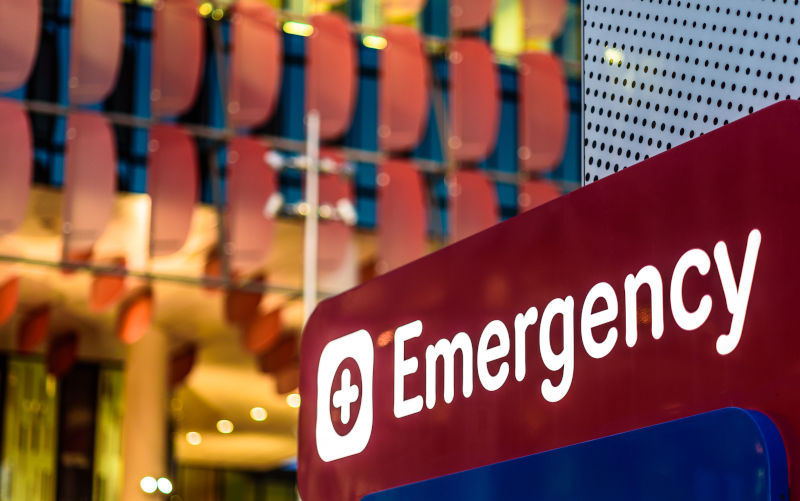Calvary hospital unresponsive? Yes, Chief Minister
May 16, 2023
Canberras Calvary Hospital is to be compulsorily acquired by the ACT Government, charged by Chief Minister Andrew Barr with being, amongst other things, unresponsive.
Much as I would rather not have to, my verdict, from recent personal experience, has to be guilty.
Not the people doing the actual healing and caring - doctors, nurses, wardspeople and others - who have tended me terrifically on my numerous visits over the course of the years.
The problem as far as I can tell is with processes, guidelines and administration.
My story is a simple one.
I presented to Calvary’s emergency department one Tuesday afternoon last October, experiencing and relaying to triage that I had chest pains and shortness of breath, the classic symptoms of heart attack. I was quickly taken through and assessed, blood was taken and my medical history provided, including a long association with the minor heart complaint atrial fibrillation.
The bloods showed no damage done, and no fibrillation occurring. I was sent home.
The next evening, when I was on my haunches with the same two symptoms after two blocks of exceedingly sedate dog walking, my concerned partner bundled me into the car and took me back to Calvary.
Again, I was quickly taken through. Again, bloods were taken and the history provided. Again, no damage was found to have been done and no fibrillation was occurring. Again, I was sent home.
After falling out of bed grabbing my chest on the Friday morning, my partner virtually carried me into the car and to Calvary we hurried once again.
This time I was told I was having a heart attack, which, you might have guessed, wasn’t a great surprise. The bloods showed some heart damage.
The team swung into action. I was stabilised and made comfortable within hours and, in coming days, four stents were inserted, the diet changed and I haven’t looked back.
The care, when it was applied, was magnificent. I’m better than I’ve been in years.
But what, I asked when I wrote to the hospital six months ago, might have happened if I’d had that heart attack somewhere alone anytime between the Tuesday afternoon and the Friday morning? What if it had been a far more serious attack than the one I had?
I received no response, from either the head of the emergency department, the head of the whole hospital nor the health minister, who all were sent a copy of my letter.
Isuppose I was another difficult customer who got lobbed into the too-hard basket; a noisy can that could be kicked down the road.
It wasn’t a dirty letter by any means.
I praised the hospital and the care I received. My problem was when I received it.
Should not the hospital consider changing procedure so that someone presenting as I did is dealt with before they have the heart attack and not turned away? Let alone twice.
Was not prevention better than cure? Did not hospitals have a duty to not only to do no harm, but to not allow any harm either?
They were simple enough questions, I thought, posed half a year ago in a temperate letter that included much praise and looked forward to some procedural change.
But Calvary management was, comprehensively, unresponsive.
I think they have let down the dedicated people who work their wards day and night.
Post Script by John Menadue, 16 May 2023
(The ACT Government is proposing to ’take over’ the Calvary Hospital in the ACT.
I support the ethos of care of the Little Company of Mary at the Calvary Hospital even though there are few Sisters there today. But I can understand that the ’take over’ would improve the integration of hospital services across the ACT.
It can hardly be said that Calvary is a private hospital when all its capital and recurrent funds come from the ACT government. The signage at Calvary tells us that it is a ‘public hospital’ and so it is.
But in my view, the mistake that the ACT government is making is that one reason given for the ‘acquisition’ of Calvary is to spend an extra $1bn for expansion of hospital beds and other facilities on the Calvary site.
That money would be much be spent on public health clinics across the ACT.
Australia has one of the highest ratio of hospital beds to population in the world. And the ACT has a very high bed density.
In the ACT we have five Walk-in-(Health) Centres but we need multidisciplinary health clinics across the ACT in all the major shopping centres. The salaried staff of these clinics would include doctors, nurses, physiotherapists, dieticians, pharmacists, dentists and other health professionals.
Patients should be treated as much as possible in their homes or as close to their homes as possible. We need to keep people out of hospitals wherever possible. That is better for patients and the taxpayer.
Primary care is the anchor of a good health system. Unfortunately primary care, gets pushed aside by urgent, acute care in hospitals. And politicians love iconic hospitals. The ACT Government looks to be continuing that foolish love affair with hospitals.)
For more on this topic, we recommend:

